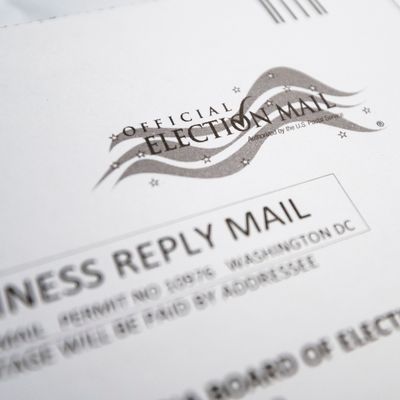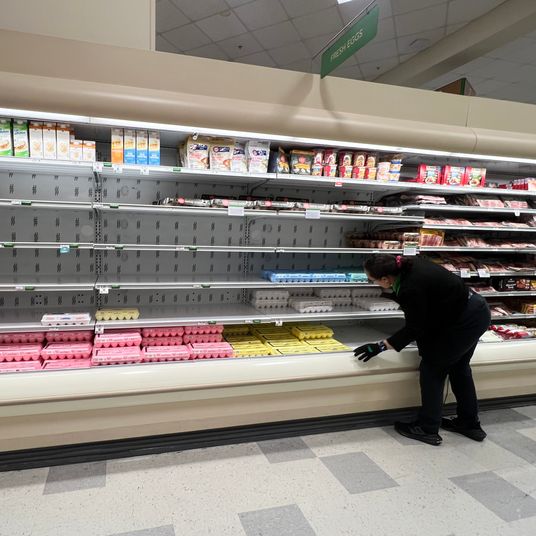
If you have been paying any attention to politics this year, you are likely aware that President Trump has been demonizing voting by mail almost incessantly, and certainly since it became apparent that COVID-19 fears were producing a strong desire to avoid dangerous live election sites, along with efforts of election officials (initially, at least) in both parties to accommodate such fears.
There is an ancient conservative prejudice against any voting innovations that burns bright at the Heritage Foundation, where hatred of voting by mail or really anything that might boost turnout is strong. Perhaps that influenced Trump, but he also seemed determined to convince his own supporters to vote in person on election day. In that, according to every available survey, he is succeeding. And that troubles some Republicans, the Washington Post reports:
Democratic voters who have requested mail ballots — and returned them — greatly outnumber Republicans so far in key battleground states, causing alarm among GOP party leaders and strategists that President Trump’s attacks on mail voting could be hurting the party’s prospects to retain the White House and the Senate this year.
Of the more than 9 million voters who requested mail ballots through Monday in Florida, Pennsylvania, North Carolina, Maine and Iowa, the five battleground states where such data is publicly available, 52 percent were Democrats. Twenty-eight percent were Republicans, and 20 percent were unaffiliated.
Additional internal Democratic and Republican Party data obtained by The Washington Post shows a similar trend in Ohio, Minnesota, New Hampshire and Wisconsin.
In a normal year, that might be seen as a sign of superior Democratic enthusiasm or organization, or perhaps even of an impending landslide. But as we know, this isn’t a normal year, and one of the peculiarities has been the alacrity with which Republican voters have heeded Trump’s warnings that voting by mail is unclean. Will this presidential crusade backfire by denying Republicans votes they might otherwise count on, at least according to the old calculus when voting by mail had no particular partisan cast?
There are pros and cons to relying disproportionately on mail ballots. The big pros are twofold: (1) there are clearly voters, particularly older voters, who may stay home and not vote at all if they cannot vote by mail, particularly during a pandemic; and (2) early votes — by mail or in person — allow a candidate or party to “bank” votes and concentrate resources on turning out key swing voters or those who are more difficult to mobilize. There’s a third factor benefiting Democrats this year: So long as Biden is in the lead, getting a portion of the electorate to go ahead and vote gives him some protection from late swings in public opinion.
The big disadvantage of heavy dependence on voting by mail is that mail ballots are much more likely than in-person ballots to be rejected by election officials for flaws ranging from late receipt to questionable signatures to errors in filling blanks and sealing envelopes. Poll workers can help in-person voters avoid or correct harmless errors; those who don’t interact with election officials at all are on their vulnerable own. This is one reason Democratic lawyers in many states are fighting for quick notice of flaws in early processed mail ballots and an opportunity to “cure” them.
In addition to the likelihood that mail ballots will deduct a significant number of votes from the totals of candidates otherwise benefiting from them, this year there is an unprecedented risk of postelection invalidation of mail ballots by the massive armies of Republican lawyers who will be instructed to challenge them, at least in areas dominated by Democratic voters. As Trump himself indicated in the first presidential debate, he’s expecting a legal battle over “fraudulent” mail ballots that will go right up to the Supreme Court, where he is currently trying to place his third justice.
And hovering over the entire process is the possibility that Trump will claim victory after forging to an early lead based on in-person voting. Then he would use political and legal measures to stop the counting of mail ballots, extend the count until deadlines have expired, and perhaps encourage Republican legislatures to appoint pro-Trump electors who ultimately determine the president and nullify the popular vote. Trump’s refusal to rule out such a scenario in Tuesday’s debate was not a good sign.
So maybe the Democratic tilt of mail ballots so far is a good thing for the Donkey Party, or more likely, it’s too early to tell. As for Republicans, they are stuck with a president who has enlisted them in a war on easier voting. And while they may work around him to encourage some voting by mail, particularly in states like Florida where it has long been central to GOP election success, Republicans voters will listen to their leader’s voice.






























